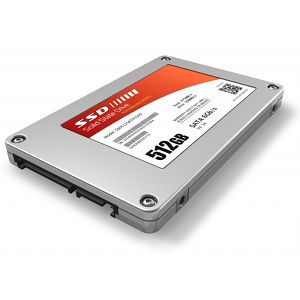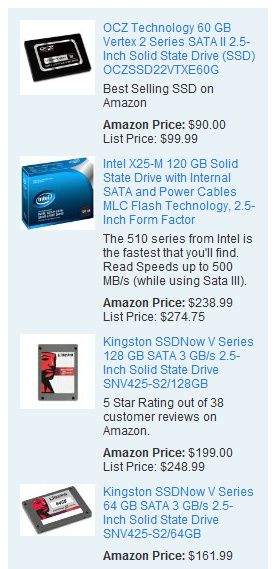If you've kept up with some of the latest news about new computer parts, you may have heard about SSDs, or solid state drives. These small, nifty pieces of hardware are designed to replace your clunky, slow hard drive and give your system a major performance boost. However, some people have experienced some hiccups by using these new pieces of technology, including usage and price.
Here we're going to discuss the exact pros and cons of owning a solid state drive and whether such an investment would be right for you.
Pro: Performance
The greatest selling point for solid state drives is, in fact, performance. SSDs use the same SATA I, II, and III ports that regular hard drives currently use. So where does the performance increase come from? To put it into layman's terms, SSDs eliminate any moving parts, so the entire device is completely electronic. Without any moving parts, the speed at which data can be read and written increases dramatically. If you need an analogy to better understand, think of it as RAM but made for permanent storage of information, although this isn't quite correct from a technical standpoint.
You can see the speed improvements in the video above by how quickly Windows 7 boots, and then loads all of the programs that show their face in the task icon area. That's a lot of them!
Pro: Easy Transition
It is also easy to transition from a hard drive to an SSD. Retail packages should include the necessary software needed to image the partitions from the hard drive over to the SSD. That way you can keep all your OS, files, and settings without reinstalling everything.
Pro: Innovative
Another selling point is the fact that it's modern and innovative. SSDs seem to be the future of storage, and for good reason, as hard drives relatively old pieces of hardware that haven't seen much design improvements at all except larger and larger amounts of storage space. It's great to see that this area is finally getting a major upgrade, and I doubt that we'll just stop at SSDs.
Con: Price
While the advantages of using an SSD are great, there are still some cons to them. For example, one of the major problems with SSDs are their price. As they currently stand you could get an SSD that has a little over 100GB for the same price as a regular hard drive that has 1-1.5TB. Therefore, buying an SSD isn't an economically viable solution for some people.
Con: Storage Space
The next issue is storage space. Compared to regular hard drives, SSDs have very small storage space compared to similarly priced hard drives. Because of this, a large amount of data simply cannot be stored onto the SSD. If you wish to get larger ones (500GB models do exist), you'll be running into sums much larger than $1,000. Some people "solve" this by deciding to place their operating system and important files onto the SSD, while keeping low-priority files on a separate hard drive.
Con: Possible Compatibility Issues
Finally, some people have rare compatibility issues with certain computer models. Although I am not sure what causes them, I have heard of those kinds of problems a couple of times, so there must be some slight truth to them. If you decide to get an SSD, I recommend that you first Google around to see if people have problems with your computer model (or certain computer parts if you built yours from scratch). Once you buy one, I'd keep the receipt in case you need to return the item.
Conclusion
Now that you've been introduced to the pros and cons, what should you ultimately do? If you're an enthusiast or a heavy computer user with a powerful system, I'd recommend getting an SSD. Just keep that extra hard drive in your system to store all your extra files. If you're a mainstream or low-end computer user, then I'd recommend that you wait on buying an SSD. Buying one wouldn't provide any performance increase because there will most likely be a bottleneck somewhere else in your system that needs to be addressed first. SSDs should become viable options for you when today's high-end systems become tomorrow's low-end systems.
What is your opinion of SSDs? Was there a pro or con that I forgot to mention? Let us know in the comments!
Image Credit: Shutterstock


